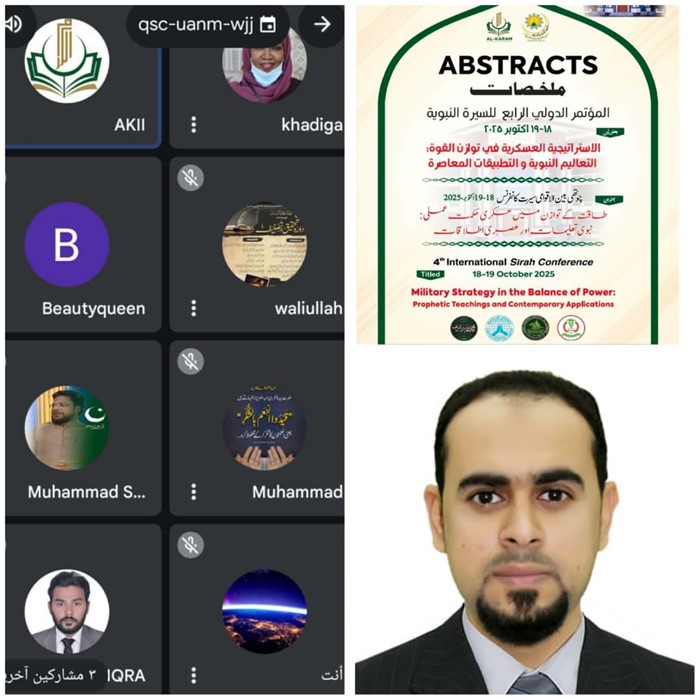Al-Ahgaff University Participates in the 4th International Conference on the Prophetic Biography in Islamabad on Military Artificial Intelligence
- 20/10/2025
- University News

Mukalla – University Media
Al-Ahgaff University participated remotely on Saturday, in the 4th International Conference on the Prophetic Biography, held under the theme “Military Strategy and Balance of Power in Prophetic Education and Contemporary Applications.” The event took place in Islamabad, the capital of Pakistan, and was organized by the Department of Islamic Studies at Al-Karam International Institute, affiliated with the Faculty of Social Sciences.
Representing Al-Ahgaff University at this distinguished international academic forum was Dr. Hashim Alawi Abdullah Muqaibel, Professor of Public International Law and International Organizations at the Faculty of Sharia and Law. Dr. Muqaibel presented a notable research paper titled:
“The Strategy of Using Artificial Intelligence in Modern International Military Conflicts: A Foundational Study from the Prophetic Sunnah.”
In his paper, Dr. Muqaibel provided an in-depth academic analysis of the concept of military artificial intelligence and the ethical challenges associated with its use in modern international conflicts. He explored the Prophetic guidance concerning advanced technologies and established Sharia-based principles derived from the Sunnah to address contemporary technological risks such as digital bias and indiscriminate killing.
Dr. Muqaibel emphasized that the Prophetic methodology offers a comprehensive ethical framework that can be applied to build a just and humane system governing the use of modern military technologies. Such an approach, he argued, ensures a balance between technological advancement and the principles of Islamic law, while strengthening the protection of civilians in the era of artificial intelligence.
The conference organizers commended the significance and originality of Dr. Muqaibel’s research, noting its strong foundational approach in linking Islamic jurisprudential concepts with emerging technological issues. They also highlighted its contemporary relevance amid the rapid global developments in artificial intelligence and its military applications.
Dr. Muqaibel concluded his participation with several key recommendations, including the call for the development of a specialized field of “Military Technological Jurisprudence” to address the challenges posed by artificial intelligence, the promotion of integration between Sharia studies and data sciences, and the initiation of intercultural dialogue between Islamic legal traditions and international law to establish global ethical codes regulating the use of military artificial intelligence.
Al-Ahgaff University was the only Yemeni university participating in this prestigious international academic event—an achievement that underscores the university’s distinguished scholarly presence and its active engagement in addressing intellectual, ethical, and global humanitarian issues.



